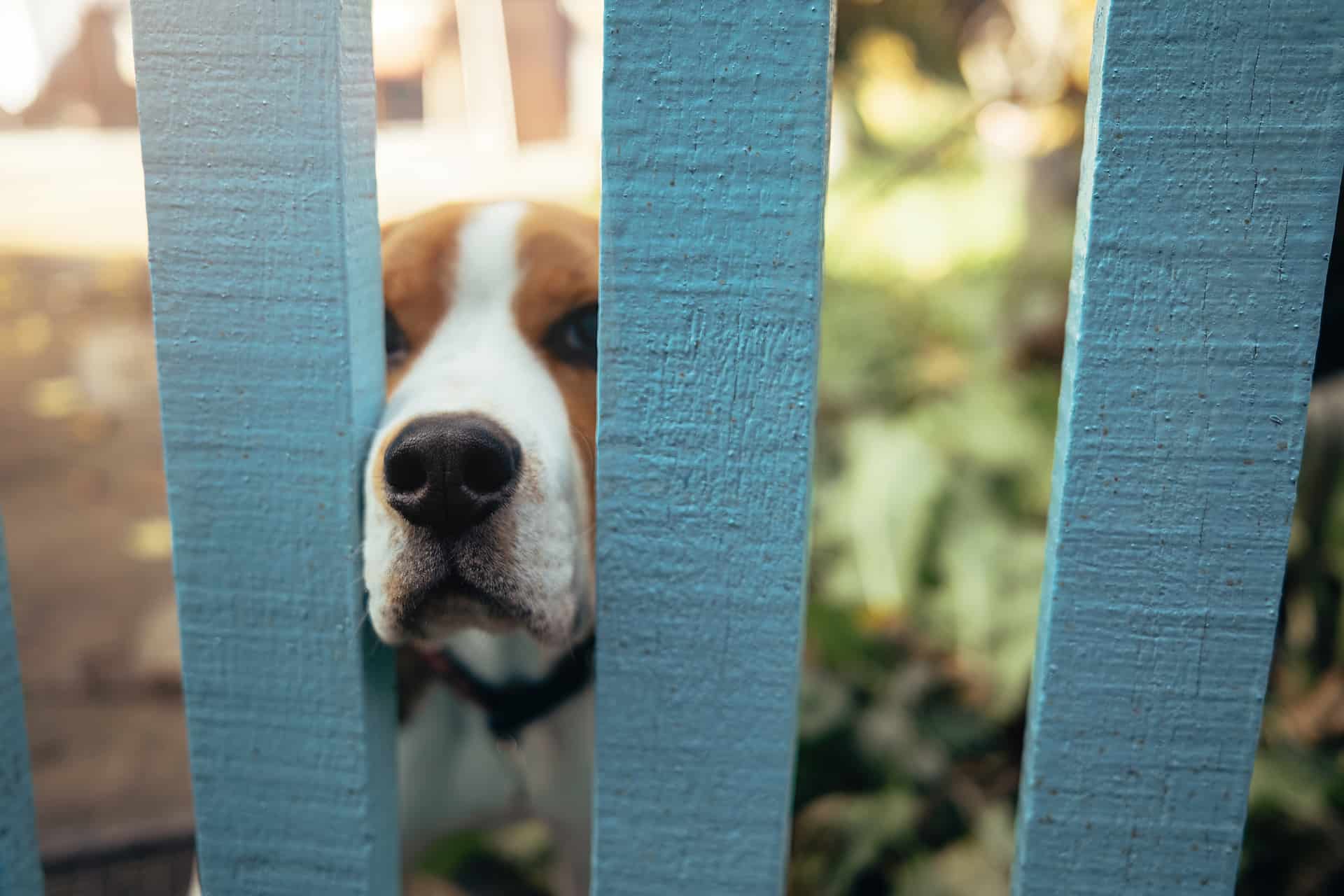How to Use Physical Barriers to Keep Dogs from Digging
Barriers can be a great way to prevent dogs from digging in your yard. Here’s how:
- Fencing: Put up a tall fence – at least 6 feet – made of tough, chew-proof materials.
- Rocks/Bricks: Dogs like to dig around tree/shrub bases. Place large rocks and bricks there to deter them.
- Chicken Wire: Put down chicken wire, then cover it with soil. The wire will give your pup an unpleasant surprise.
- Raised Beds: If you have a garden, build raised beds to stop the dog from digging.
These barriers work well and keep your pup and yard safe.
Temporary Barrier Options
Get physical! Barriers are the best way to keep Fido from digging in your yard. Make sure the barrier goes a few inches down into the ground and has a solid edge. This will help stop your pup from sneaking under or around it. Here are some temporary barrier choices to keep your pup’s paws off your yard!
Chicken Wire Fence
Want a temporary fix to stop your pups from digging your garden or yard? Chicken wire fencing might be just the thing! Here’s how to use it:
- Figure out the area you want to protect and how tall the fence should be.
- Unroll the wire, cut to size, and attach one end to a corner post with staples or zip ties.
- Keep it taut and straight, and attach it to the other posts.
- Bury the bottom of the fence 3-6 inches deep and bend it out. That’ll discourage digging.
- Make sure there are no gaps between the ground and fence.
Pro Tip: Put some large rocks along the bottom of the fence to make it extra secure.
Mesh or Hardware Cloth Fence
Mesh or Hardware Cloth Fence is a great option for a temporary fence to keep dogs from digging. Here’s how to use it:
- Choose the right material. It should be long-lasting and rust-resistant.
- Measure the area to figure out how much material you’ll need.
- Dig a trench, burying 2-3 feet of the fence into the ground.
- Secure the top to posts or stakes in the ground.
- Cover the fence with decorative rocks or plants.
- Inspect and repair the fence regularly.
- Pro tip: Put chicken wire on the ground and cover it with soil before installing the fence.
Garden Fence
Garden fences are great for keeping out unwanted diggers and pets. And there are many temporary barrier choices that are cheaper and easier to install than permanent ones!
- Wire fencing is a secure option that dogs can’t dig through. It’s lightweight, easy to put up, and you can cut it to fit any area.
- Chicken wire is also great, as it’s flexible and can be shaped. But it’s only good for small areas.
- Garden netting is perfect, too. It’s simple to install and provides a physical barrier while allowing air and sunlight to reach your plants.
Pro tip: Use stakes to keep temporary fences in place. Also, make sure to train your dogs to stay away from the fence to avoid damage.
Permanent Barrier Options
Physical barriers are great to stop dogs from digging up your yard. It can be a permanent structure or just a temporary solution – depending on your choice and how determined your pooch is. Permanent options could be underground fences, hardscaping and other stuff. Let’s explore each one and see how it can shield your garden from bad digging!
Wood Fence
Wood fences make great permanent borders for keeping dogs from digging in your garden. Here are some tips for creating an effective physical fence:
- Dig a trench around the edge where the fence will go – 1-2 feet deep.
- Fill the bottom of the trench with gravel.
- Put the wood fence posts in the trench and secure with concrete or gravel.
- To make sure the fence is tall enough to stop the dog jumping, add trellis or mesh material.
- Lastly, use landscaping close to the fence; like barberries or holly.
Crazy tip: Consider using chicken wire or chain link fences with wood fencing for more reliable physical barriers for dogs.
Vinyl Fence
Vinyl fences are a great option for keeping dogs from digging, as an alternative to harsher methods, like electric or shock collars. Here’s how to use them:
- Choose a fence that’s tall enough so the dog can’t jump over, and without any gaps they can squeeze through.
- Install it firmly and make sure there are no loose sections.
- Create visual barriers, like planting bushes or trees, or placing large decorative rocks in front of the fence.
Vinyl fences are effective and durable – and can keep your yard looking beautiful.
Brick or Stone Wall
Brick and stone walls are ideal for keeping dogs out of your yard. They’re strong and long-lasting, and they also add a nice touch to your garden. When constructing a wall, bear in mind:
- Height – Make it tall enough that the dog can’t jump over.
- Depth – Dig deep enough so the pup can’t get underneath.
- Foundation – Level and compact the ground for a solid base. Add steel or concrete for reinforcement.
- Mortar – This holds the bricks or stones together and adds to stability.
Pro tip: To stop any attempts at climbing, put a fence or trellis on top of the wall.
Digging Deterring Tips
Digging can be a problem with dogs. Physical barriers are great for helping stop this. These can be fences, walls, rocks, or plants.
Let’s explore using physical barriers to stop your dog from digging.
Bury a chicken wire fence
Want to keep dogs from digging in your yard? Bury a chicken wire fence! Here’s how:
- Dig a trench 1 foot deep & 6 inches wide around the area you want to protect.
- Cut a section of chicken wire to fit the trench’s length & width.
- Place the wire in the trench, covering the entire length & width.
- Backfill the trench with soil & tamp it down firmly.
- Make sure the chicken wire is buried 6 inches deep & flush with the ground.
This fence will stop dogs from digging & save your lawn & garden.
Pro tip: Use mulch, rocks, or gravel to further deter digging.
Place large rocks or pavers
Got a pup that loves to dig? Big rocks or pavers can help out! Here’s the plan:
- Identify the area you want to keep them from digging in.
- Put those big rocks or pavers in a line or grid-like formation.
- Make sure they’re too big for your pup to move.
- To make it more sturdy, bury them a bit in the ground.
- Eventually, they’ll learn not to dig there.
Pro tip: Give them an alternative spot to dig, like a sandbox or pit. Redirect their digging behavior!
Train your dog to dig in a designated area
Train your pup to dig in a place you want! Here’s how:
- Choose an area of your yard for digging.
- Hide your pup’s favorite toy or treat under the soil in the spot.
- Use verbal cues and praise when they dig in the right spot.
- Say “no” if they start digging someplace else, and direct them back to the designated area.
- To discourage digging elsewhere, use barriers like chicken wire or rocks.
- Remember: Be consistent! Then your dog will quickly learn where to and not to dig.
Maintenance and Safety
Physical barriers are awesome for stopping your pup from digging in the yard. Barriers like chicken wire, fencing, and rocks can make a secure boundary. Plus, having your pup on a leash in the yard is a great way to avoid digging. Let’s look at the best barrier types, how to install them properly, and how to keep the yard safe.
Regularly check and maintain the barrier
Physical barriers can keep dogs from digging in your yard, but need regular maintenance. Check them often for signs of damage. Fix weak spots with more materials. Take away anything that could be used to dig under or around the barrier. Make sure it’s tall enough to stop the dog from jumping over. Add deterrents like spikes or scents to discourage digging near the barrier. With maintenance and regular checks, physical barriers are an effective solution to keep dogs from digging in designated areas.
Use caution with sharp materials
When using physical barriers to stop Fido from digging, safety must be a priority! Here are some tips:
- Use only materials that won’t harm your pup. Like, chicken wire with smooth edges but not sharp ones.
- Avoid anything slippery when wet, such as glass shards – these are dangerous for your pet.
- Teach your pup the new boundary and keep an eye on them until they get it. Give them praise when they obey the boundary.
- Always wear gloves and protective clothing when handling sharp materials – for your own safety!
- Pro tip: Train your pup humanely, and if you’re having trouble, see a pro dog trainer.
Complete all projects safely
Safety is key for any home improvement or gardening project. To keep dogs from digging in your garden, use physical barriers.
Border the garden with a fence or chicken wire. Cover any holes or gaps with rocks or bricks. Put a mesh cover over plants. Keep hazardous tools and equipment out of reach of children and pets. Always wear protective gear like gloves and goggles when handling sharp tools. Make sure electrical tools are functioning well to avoid electrocution.
By doing this, you can rest assured that projects will be done safely.
Frequently Asked Questions
1. What are some physical barriers I can use to keep my dog from digging?
Some examples of physical barriers include fences, chicken wire, and garden edging.
2. How high should my fence be to keep my dog from jumping over it?
The fence should be at least 6 feet tall to deter most dogs from jumping over it.
3. Do I need to bury the barrier underground to keep my dog from digging under it?
Yes, it’s recommended to bury the barrier at least 1-2 feet underground to prevent dogs from digging under it.
4. Can I use plants as a physical barrier to keep my dog from digging?
Yes, some plants like boxwood, rosemary, or lavender can act as a natural barrier, but they may not be as effective as other physical barriers.
5. How can I train my dog not to dig even with a physical barrier in place?
You can train your dog by providing them with an appropriate digging area, rewarding good behavior, and consistently redirecting them from digging in prohibited areas.
6. Is it safe to use an electric fence as a physical barrier for my dog?
Electric fences can be effective, but they should only be used under the supervision of a professional dog trainer and should not be used on aggressive dogs.







